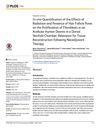
Search
for
Sort by
Research
30-60 / 427 results

research Diagnosing Vascular Causes of Renal Failure
International medical graduates scored higher than U.S. graduates on a medical exam.

research Correction: Coliform Units
In 1995, international medical graduates did better than U.S. graduates on a medical exam.

research Liver Cirrhosis and Circadian Rhythm
Taking high doses of fluconazole for a long time can cause reversible hair loss.

research Quantitation of Hepatitis C Virus RNA
Long-term high-dose fluconazole can cause reversible hair loss.

research The North American Menopause Society Recommendations for Clinical Care of Midlife Women
The NAMS 2014 recommendations guide healthcare providers on treating health issues in midlife women, emphasizing individualized care and informed decision-making.

research Adverse Effects of Opioid Analgesic Drugs
Opioid painkillers can cause many side effects, including breathing problems and addiction, but are generally considered safe when used properly.

research Summary of the Recommendations on Sexual Dysfunctions in Women
Experts recommend thorough medical, sexual, and psychosocial assessments for women's sexual dysfunctions, and suggest individualized treatment plans with regular check-ups. They also mention potential use of estrogen and androgen therapy, but with caution due to safety concerns.

research Isotretinoin Treatment of Acne and Related Disorders: An Update
Isotretinoin effectively treats severe acne and similar conditions, but has common, mostly reversible side effects, requiring careful patient monitoring.

research Tissue Engineering and Regenerative Medicine: Achievements, Future, and Sustainability in Asia
Asia has made significant progress in tissue engineering and regenerative medicine, but wider clinical use requires more development.

research Human Hair Follicles Contain Two Forms of ATP-Sensitive Potassium Channels, Only One Sensitive to Minoxidil
One minoxidil-sensitive potassium channel exists in human hair follicles.

research Adverse Cutaneous Reactions to Soft Tissue Fillers: A Review of the Histological Features
Different soft tissue fillers can cause various skin reactions; biodegradable fillers are safer and non-biodegradable ones like silicone can lead to long-term problems.

research Toxic Epidermal Necrolysis: A Review of Etiology, Diagnosis, and Management
Toxic epidermal necrolysis is a severe skin condition often caused by drugs, with complex treatment and a high risk of death, but survivors usually heal without scars.

research What Do We Know About Phytotherapy of Benign Prostatic Hyperplasia?
Some plant-based treatments can help with benign prostatic hyperplasia symptoms, but more research is needed to confirm their safety and effectiveness.

research The Hairless Gene of the Mouse: Relationship of Phenotypic Effects with Expression Profile and Genotype
Mutations in the hairless gene in mice affect its expression and lead to a range of developmental issues in multiple tissues.

research Treatment of Male Pattern Baldness with Botulinum Toxin: A Pilot Study
Botox increased hair count in men with baldness and might work by improving scalp blood flow.

research An Approach to the Patient with Hirsutism
The document concludes with guidance for doctors on diagnosing and treating hirsutism effectively and safely.

research The Hair Follicle: An Underutilized Source of Cells and Materials for Regenerative Medicine
Hair follicles are valuable for regenerative medicine and wound healing.

research Androgen Antagonists in Androgen Target Tissues
Antiandrogens have important biological effects, but more research is needed to understand them fully and compare their effectiveness and side effects to other treatments.

research Laser Hair Removal: Efficacy and Challenges
Laser hair removal works well for people with dark hair and light skin, but it's less effective for light hair or dark skin; improvements are expected.

research Consequences of Steroid-5α-Reductase Deficiency and Inhibition in Vertebrates
Lack or blocking of SRD5a, a key component in hormone creation, can lead to conditions like pseudohermaphrodism and affect hair growth, bone mass, muscle strength, and reproductive health. More research is needed on its regulation from fertilization to adulthood.

research Expression of Bioactive Recombinant Human Fibroblast Growth Factor 10 in Carthamus Tinctorius L. Seeds
Scientists made safflower seeds produce a human growth factor that could help with hair growth and wound healing.

research Sleep Problems Are Associated with Development and Progression of Lower Urinary Tract Symptoms: Results from REDUCE
Poor sleep is linked to a higher risk of developing and worsening urinary problems in men.

research Vitamin D Receptor-Mediated Control of Soggy, Wise, and Hairless Gene Expression in Keratinocytes
Vitamin D receptor helps control hair growth genes in skin cells.

research Current Treatment of Benign Prostatic Hyperplasia
TURP is the best treatment for BPH, but some patients prefer medications like alpha-blockers and finasteride.

research Treatment of Androgen Excess in Females: Yesterday, Today, and Tomorrow
The document concludes that treating androgen excess needs patience, managing expectations is important, and many drugs used are not officially approved, suggesting cosmetic options for mild cases.

research Recent Advances in the Medical and Surgical Treatment of Priapism
New treatments for long-lasting erections improve outcomes but must be timely to avoid lasting damage.

research In Vivo Quantification of the Effects of Radiation and Presence of Hair Follicle Pores on the Proliferation of Fibroblasts in an Acellular Human Dermis in a Dorsal Skinfold Chamber: Relevance for Tissue Reconstruction Following Neoadjuvant Therapy
Hair follicle pores help cell survival and growth, even after radiation.

research Hematuria and Hematospermia Associated with the Use of Finasteride for the Treatment of Androgenic Alopecia: A Case Report
Finasteride for hair loss may cause painless bleeding in urine and semen.

research Role of Environmental Factors and Gonadotoxin Exposure in Unexplained Male Infertility
Environmental factors and exposure to toxins may contribute to male infertility by affecting sperm and hormone function.